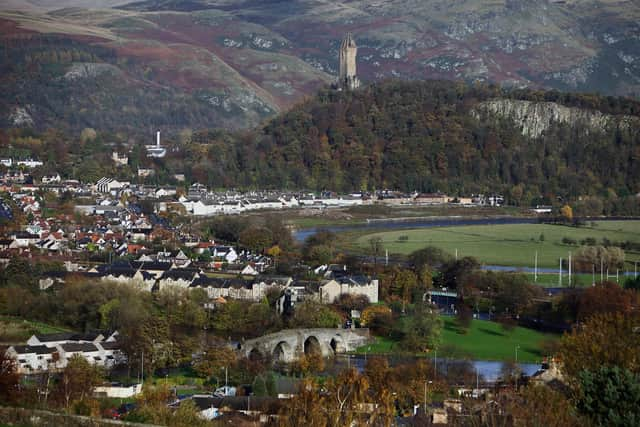Climate change: Firth of Forth catchment area has been turned into a living laboratory – Professor Andrew Tyler
These extremes impact on water quality, cause biodiversity decline and create carbon losses, with wider threats to food security, human health, society and the economy.
Yet, water also holds solutions. How we manage water can increase our resilience to extreme events, reverse declines in biodiversity and increase our carbon storage, propelling us to net-zero emissions more quickly. Equally, water offers opportunities to drive sustainable resource use and energy recovery within a new green economy.
Advertisement
Hide AdAdvertisement
Hide AdTake our peatlands for example. Peaty soils cover around 20 per cent of Scotland, holding the equivalent of 140 years of greenhouse gas emissions. Yet, an estimated 80 per cent of these peatlands are damaged; once this happens, peatland loses more carbon than it captures.
Damaged peat gets into rivers and must be filtered out, contributing significantly to the cost of water treatment. However, restored peatland retains water which, as well as trapping carbon, improves water quality and mitigates against flooding and drought.
Even in Scotland, the frequency of droughts is anticipated to increase, separated by periods of increased rainfall resulting in flooding. Restored peatland will play a vital role in mitigating against these extremes, whilst boosting the habitat for rare plants, insects and other wildlife.
Peatland is just one example of how enhancing natural capital, alongside decarbonising our economy, can mitigate the effects of climate extremes and deliver wider environmental, social and economic benefits. By erasing traditional siloes and connecting industry with government, regulators, universities, and communities, we can deliver solutions that support a just transition to net zero and position the environment as an enabler for the economy.


Critical to success is bringing the environment to the heart of decision-making. This mission is central to Scotland’s International Environment Centre, at the University of Stirling, where we are building a living laboratory across the Firth of Forth catchment – the Forth Valley Environmental Resilience Array (Forth-ERA).
With the Stirling and Clackmannanshire City Deal and partnerships with BT, Scottish Water, the Scottish Environment Protection Agency and others, Forth-ERA combines state-of-the-art sensors with satellite observation and real-time analytics to model the effects and quantify the benefits of different interventions.
The resulting intelligence will help to de-risk pro-environmental decision-making for businesses, supporting the creation of greener infrastructures and enabling more efficient use of resources.
For a braver, greener world, we must collaborate. My mission as Scotland’s Hydro Nation chair is to bring the Scottish water sector together to drive us to net zero and beyond. A unified Hydro Nation can enable a digital revolution in environmental monitoring to cut emissions, improve health and well-being and catalyse new business, research, and innovation.
Advertisement
Hide AdAdvertisement
Hide AdAfter all, the race to net zero is not only an environmental imperative, but a social and economic one too.
Andrew Tyler is professor of environmental science at the University of Stirling, Scotland’s Hydro Nation chair and a fellow of the Royal Society of Edinburgh. The RSE is Scotland's National Academy, which brings great minds together to contribute to the social, cultural and economic well-being of Scotland. Find out more at rse.org.uk and @RoyalSocEd.
A message from the Editor:
Thank you for reading this article. We're more reliant on your support than ever as the shift in consumer habits brought about by coronavirus impacts our advertisers.
If you haven't already, please consider supporting our trusted, fact-checked journalism by taking out a digital subscription.
Comments
Want to join the conversation? Please or to comment on this article.